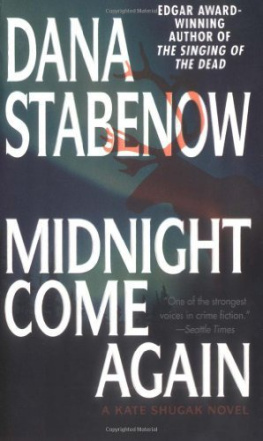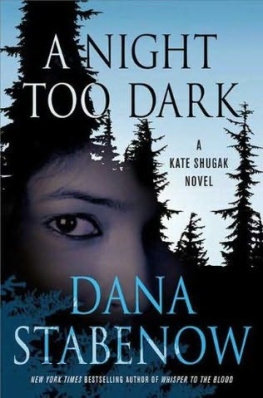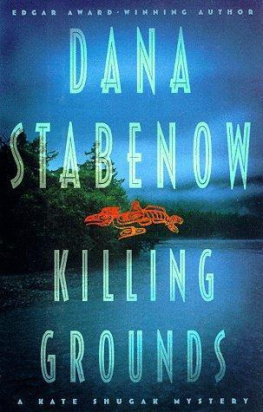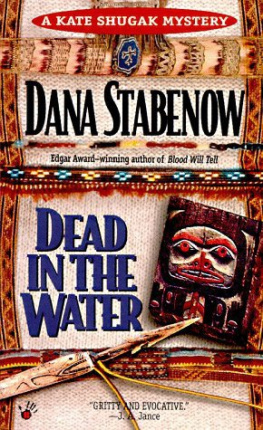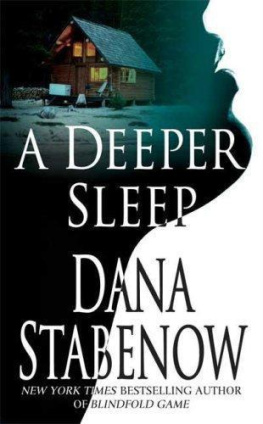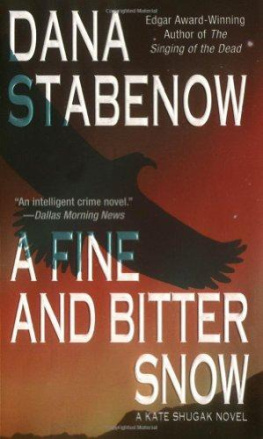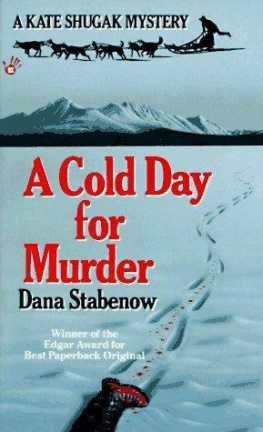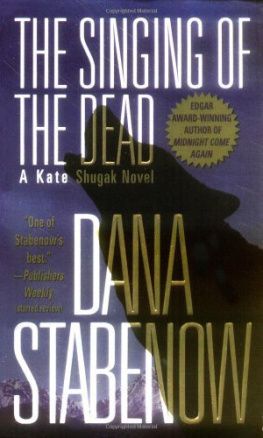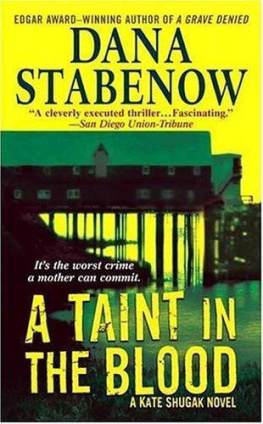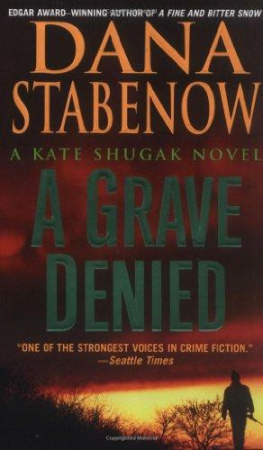MIDNIGHT COME AGAIN
Kate Shugak 10
DANA STABENOW
Jane Adams
St. Martin's/Minotaur Paperbacks Titles by Dana Stabenow Midnight Come Again The Singing of the Dead
A Fine and Bitter Snow (Available in hardcover)
MIDNIGHT COME AGAIN
DANA STABENOW
St. Martin's Paperbacks
NOTE: If you purchased this book without a cover you should be aware that this book is stolen property. It was reported as "unsold and destroyed" to the publisher, and neither the author nor the publisher has received any payment for this "stripped book."
MIDNIGHT COME AGAIN
Copyright 2000 by Dana Stabenow.
Excerpt from The Singing of the Dead copyright 2001 by Dana Stabenow.
All rights reserved. No part of this book may be used or reproduced in any manner whatsoever without written permission except in the case of brief quotations embodied in critical articles or reviews. For information address St. Martin's Press, 175 Fifth Avenue, New York, N.Y. 10010.
All chapter headings are lines from poems from Mary TallMountains's
The Light on the Tent Wall, reprinted with permission of the American Indian Studies Center, UCLA, copyright Regents of the University of California.
ISBN: 0-312-97876-6
Printed in the United States of America St. Martin's Press hardcover edition I May 2000
St. Martin's Paperbacks edition I May 2001
St. Martin's Paperbacks are published by St. Martin's Press, 175 Fifth Avenue, New York, N.Y. 10010.10 98765432
For jeannie delavern stabenow thanks for loving dad
PROLOGUE. st. petersburg, march 25
The elegant columns and fabulous spires of the old city seemed to float in the pale gold light of the soft spring dawn, adrift on a sea of morning mist.
And why not, thought Kiril Davidovitch, bouncing in his seat as the armored truck lurched through yet another pothole. With Lake Ladoga to the northeast and the Gulf of Finland to the southwest and the Neva River and its many tributaries between, the buildings designed with such grace and style by Peter the Great's imported French and Italian architects almost three centuries before were in perfect position to set sail at the first high tide.
He propounded this thought to the truck's driver. The burly man with the bushy eyebrows deepened his scowl, shifted down to take the bridge over the Kanal Griboyrdova and growled, "Good. Ship the whole goddamn place across the Atlantic and let the Americans buy it. They'll buy anything, even," he sneered, "St. Petersburg."
Fyodor still resented the return to Leningrad's original name. It was an insult, to the state, to Communism and to Lenin himself, that poor mummified bastard. He'd roll over in his glass casket if he knew.
After seven months of riding next to him, Kiril was aware of Fyodor Chirikov's deep resentment over the fall of Communism in Mother Russia.
That fall had, in Fyodor's view, led directly to the loss of his subsidized apartment in the Nevsky Prospekt, which in turn compelled him to take his present job with Security Services, Inc., one of the new companies springing up like weeds all across the new nation, half of which were fronts for what Bobbie Batista had taken to calling the Russian Mafia.
Kiril loved Bobbie Batista. He loved CNN, and the ten-second clips of pictures showing him life in the West. One day he hoped to travel there, and perhaps convey his respects to Ms. Batista in person.
Just past the Gostiny Dvor Department Store Fyodor swerved the truck around a shabby orange barricade with
"Detour!" marked in large, hand-painted letters. Kiril didn't flinch.
Nobody obeyed street signs in the city. They had a nasty habit of having been set there by thieves who had the intention of separating you from your vehicle and putting it up for sale in pieces in the city marketplace a kilometer away.
Fyodor spoke Kiril's thoughts out loud. "Lousy thieves. Stalin would have known how to deal with them."
Kiril was more tolerant. What could you expect? The only people who had any knowledge of a free market were the crooks who had been running the ubiquitous and extremely profitable black market since before Lenin was elected. It was natural that the crooks would step in to fill the gaps in supply and demand, in production and distribution.
He, Kiril, was content to wear a stiff blue uniform and ride shotgun, like John Wayne in Stagecoach, to earn enough to buy black bread and sausages and the occasional bottle of vodka. It was also enough to pay for his own bedroom in a shared flat, to which more often than not he could entice a girl to share his bed. His bed was his most prized possession; a four-poster relic of a more gracious (Fyodor would say degenerate) age, with a marvelously carved headboard and box springs, and a mattress and linens he had cheerfully beggared himself to buy.
Which reminded him of the little cashier in the black sedan in front of them. She was pretty, with smooth skin, velvety brown eyes and little breasts like apples pushing up the front of her suit jacket. It had been cold outside the bank that morning as they stood waiting for the branch manager to unlock the door. The little cashier had had no coat on, and the rough wool fabric over her breasts had peaked where her nipples had hardened. He would have liked to have slipped a hand beneath that jacket to see if those breasts were as firm as they looked. She had caught his appreciative glance and her smooth skin had flushed a delicate pink, the color of the dawn sky above, but she hadn't looked angry and she hadn't looked away.
The neat blond head was framed now in the rear window of the sedan, and he imagined that she could feel the weight of his gaze, enough so that he wasn't surprised when she turned to flash him a shy smile. The truck's windshield was masked with plate steel, leaving only a narrow horizontal slit through which to see and be seen, but Kiril knew she smiled at him. The branch manager next to her must have thought so, too, and must not have liked it, because he snapped something that had her obediently facing forward again. Strands of blond hair cupped her collar in a neat, shining line. Kiril imagined running his fingers through that hair, imagined the little cashier rubbing her head against his palm like a cat, purring like a cat, too. She would purr, he was sure of it. He couldn't wait to find out if he was right. That night, perhaps.
Fyodor observed all this with a sour expression. "The Romeo of the Rentacops strikes again."
Kiril grinned and gave a modest shrug. "What can I say? The ladies, they love me."
Fyodor grunted. The heavy truck bounced again as they ran over another, deeper pothole. "Whoa there, pardner," Kiril said in his best Duke impression, and grabbed hold of the armrest to keep from rolling into Fyodor's lap. "Watch it. Don't want to upset all those rubles riding around in back."
Fyodor grunted again, disdainfully this time. He didn't approve of money, or currency transfers, or banks either, for that matter.
Property, all property, should be held in common, by all citizens.
Profit, especially profit earned by lending money at extortionate rates to those who knew no better, was an abomination.
Still, it wouldn't do to lose their escort entirely. The truck slowed almost to a halt. "Can you see the soldiers?"
Kiril bent down to peer into the rearview mirror. He laughed. "Yes. One fell off the outside of the troop truck. They've stopped to wait for him to catch up."
Fyodor swore and double-clutched into second. The gears crashed together and the armored truck began to jerk forward.
Kiril braced both hands against the dash and tried to keep his spine from snapping off at the neck. "What are you doing," he said, dutiful but not really alarmed. It was only Fyodor, rebelling against the new world order on schedule. "You know the rules, we wait for the soldiers."
Next page
